Finland’s family cafes are helping solve one of parenting’s biggest problems
Snow blankets the Finnish city of Espoo, on the outskirts of Helsinki, on a Friday morning in November. A dozen strollers are parked to the side of a cream-colored house. The chimney is fuming, and screams and laughter can be heard from the back of the house, where parents and children are sledding down a hill. Inside the house, people are talking and the smell of cookies in the oven wafts out from the kitchen to the room next door, where children are assembling gift bags for Father’s Day on Sunday. At various points throughout the morning, 11 moms and 13 children take over the Kotikolo family café, playing with the finger puppets that line the walls of the playroom and kitchen, along with every kind of toy and book imaginable. There are newborns and toddlers, young moms and older ones.
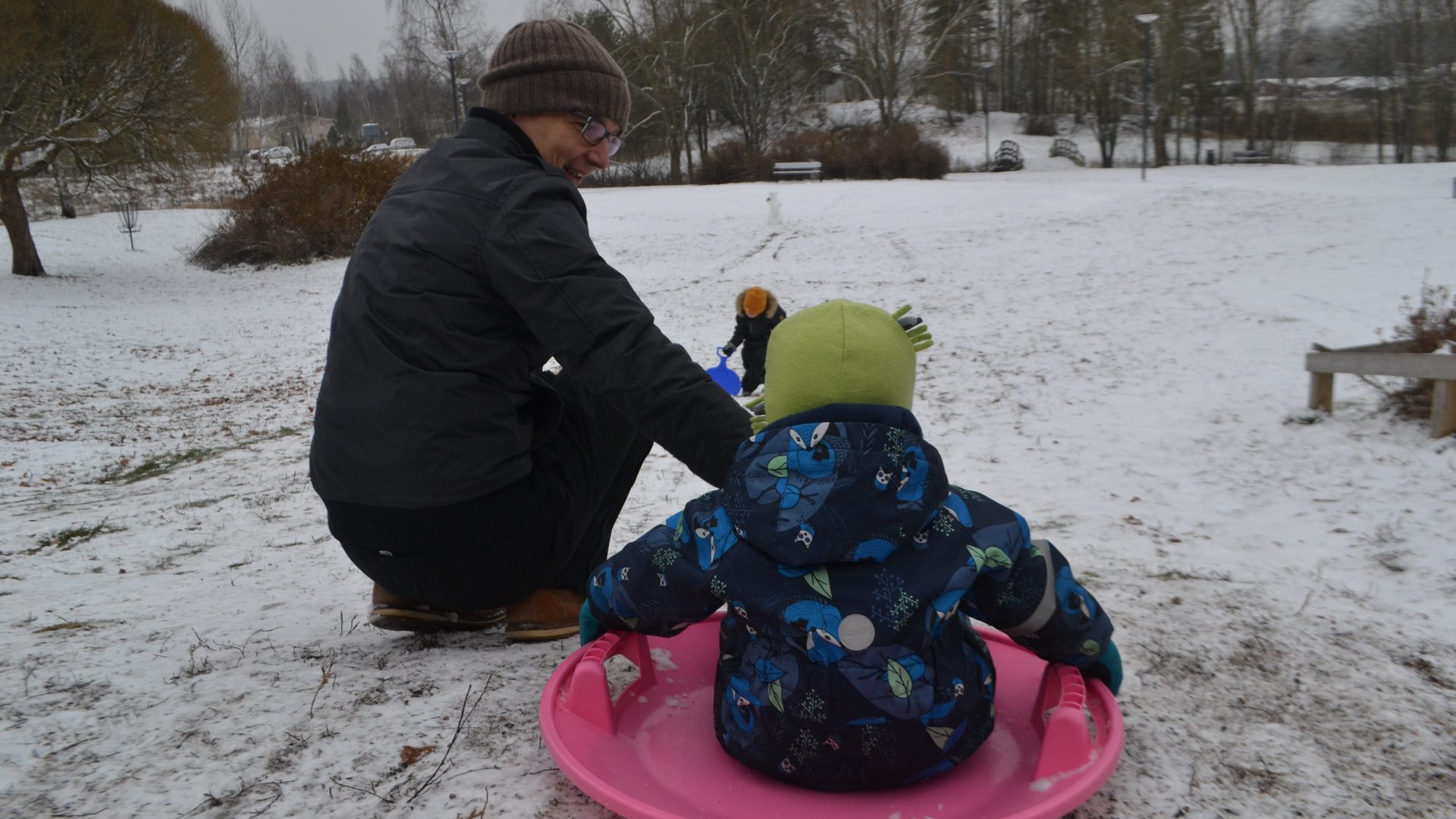

Snow blankets the Finnish city of Espoo, on the outskirts of Helsinki, on a Friday morning in November. A dozen strollers are parked to the side of a cream-colored house. The chimney is fuming, and screams and laughter can be heard from the back of the house, where parents and children are sledding down a hill. Inside the house, people are talking and the smell of cookies in the oven wafts out from the kitchen to the room next door, where children are assembling gift bags for Father’s Day on Sunday. At various points throughout the morning, 11 moms and 13 children take over the Kotikolo family café, playing with the finger puppets that line the walls of the playroom and kitchen, along with every kind of toy and book imaginable. There are newborns and toddlers, young moms and older ones.
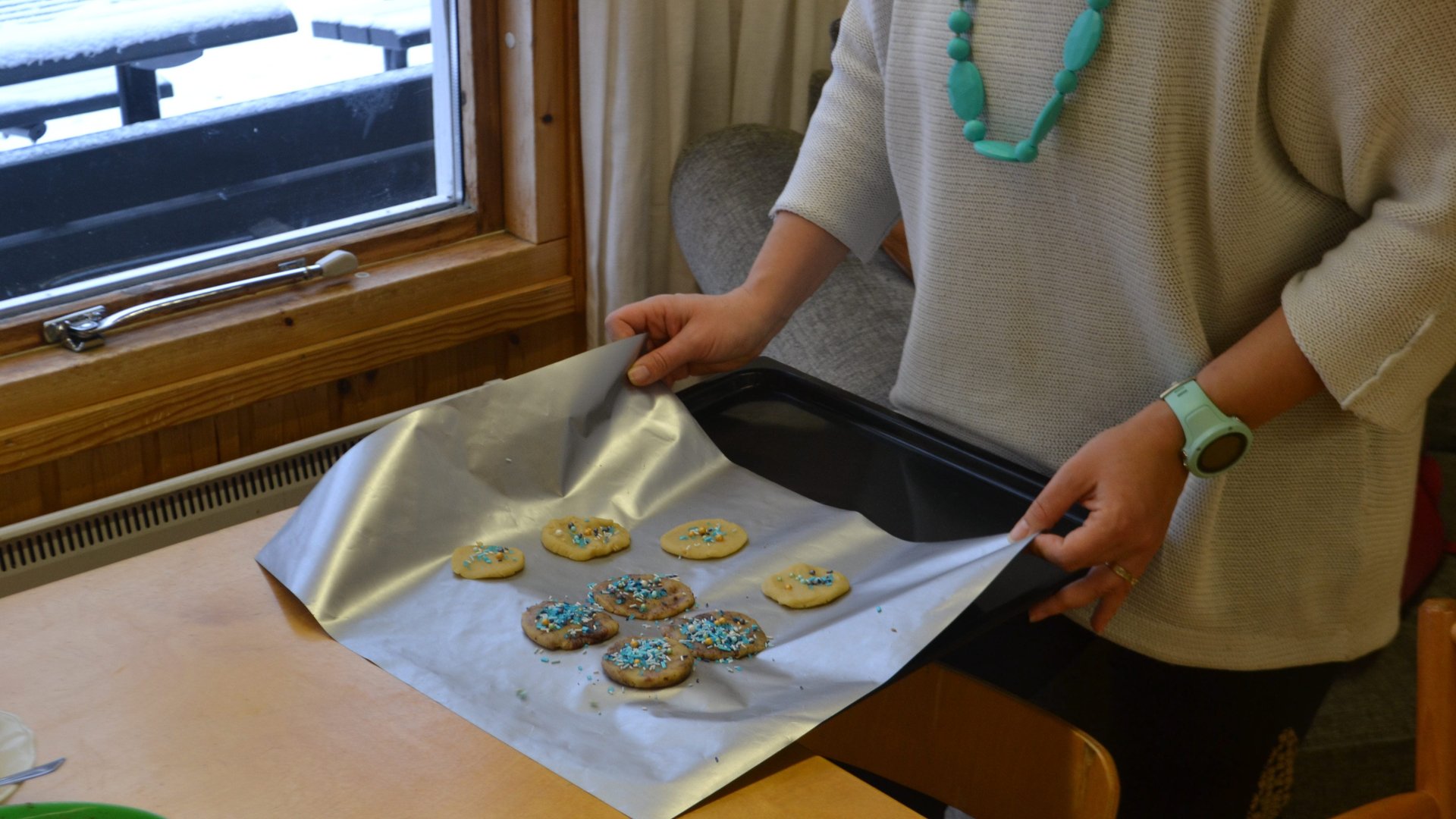
The Kotikolo family café is run by the Nöykkiö Local Association, a community group that comes under the umbrella of the Mannerheim League for Child Welfare (MLL), Finland’s largest nonprofit dedicated to child and family welfare. Family café sessions, run by MLL volunteers, take place every week across the country. Parents pay 2€ ($2.20) to attend. At the sessions, they meet other parents and chat over coffee and pastries while their children play together in a communal space. In 2018, MLL groups ran 24,235 sessions in 655 family cafés, which were attended by nearly 400,000 parents and children. Cafés like these first began in Sweden in the 1970s (pdf), and expanded to other Nordic countries in the early 2000s.
Finland offers some of the world’s most generous maternity leave, but partially as a result, many new parents are lonely. After having a baby, mothers can stay home for 105 weekdays, or about three-and-a-half months, with full pay. New fathers can stay home for up to 54 weekdays. Then, mother or father can take 158 weekdays of parental leave with partial pay. And after that, father or mother can take unpaid childcare leave until their infant turns three. About 12% of parents (mostly mothers) stay home for at least 24 months.
Science tells us this is exactly what babies need. In the early years, they are dependent on their caregivers, not just to survive, but also to thrive. But three years—the maximum leave available to a working parent—is a very long time for an adult to spend at home, mostly alone with a baby. That’s where family cafés come in, providing opportunities for parents who are on leave or who don’t work outside the home to befriend other parents. In some family cafés, children also get to spend time with older volunteers, and parents learn about their child’s development through sessions run by MLL staffers.
Anecdotal evidence shows that family cafés improve mothers’ mental health and encourage parents to exchange knowledge about child-rearing. But their existence depends on there being enough new parents—as well as babies—to fill them up. In Finland, like in many other European nations, rapidly declining fertility makes that uncertain.
“The days felt long like the Sahara.”
Between 2018 and 2019, MLL surveyed 408 parents and asked them why they chose to attend family cafés. More than 70% completely agreed or agreed that they did it because they made new friends, and 67% said it was because their child made new friends.
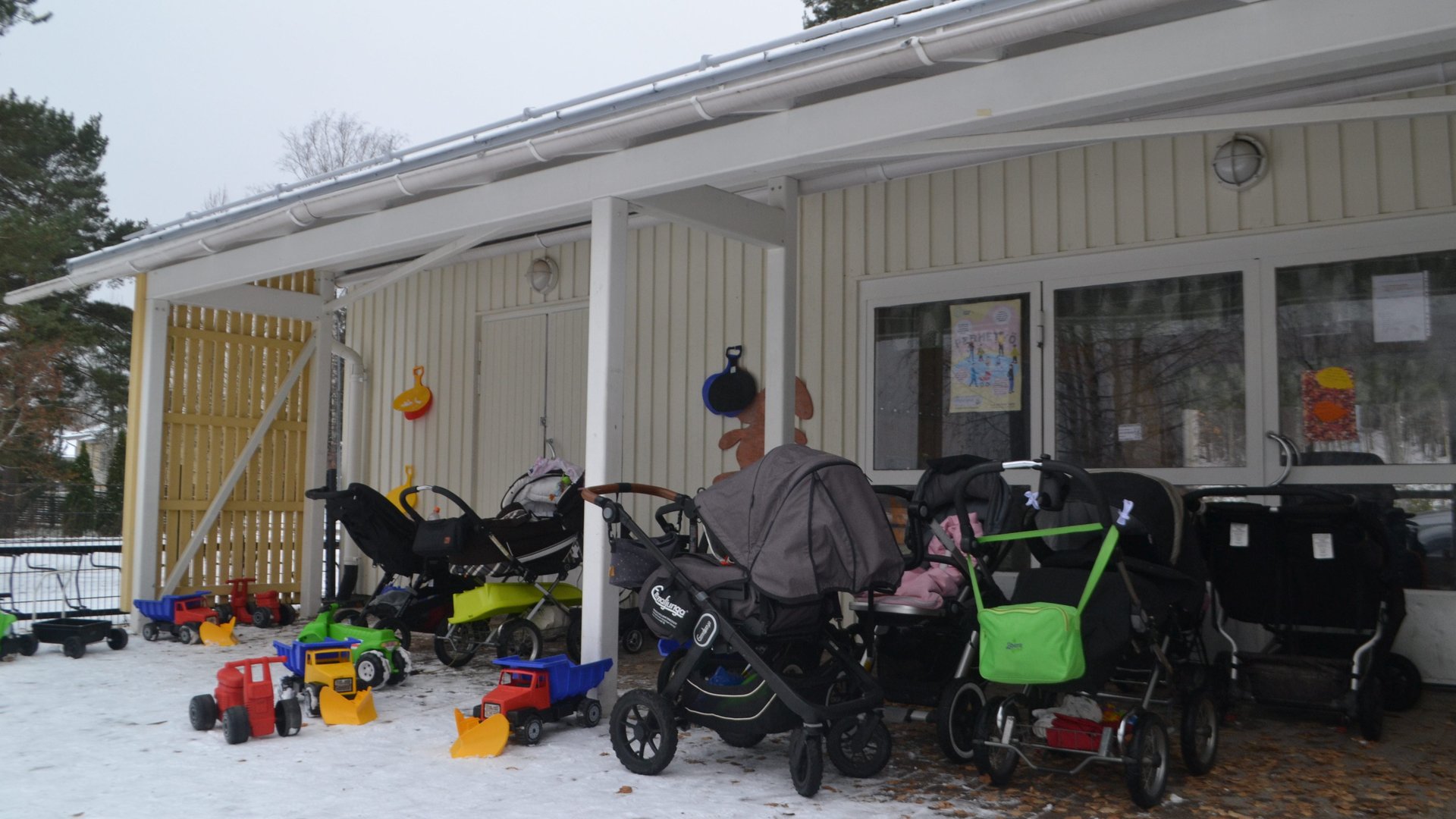
New parenthood can be an extremely lonely experience. The 4 am wake-ups, the constant diaper changes, breastfeeding—all of it takes its toll on parents. In adults, loneliness has been linked with depression, among other adverse health outcomes. And maternal depression can affect the mother-infant bond, with severe consequences for the child’s health, learning, and cognitive outcomes later in life. A 1990s Finnish longitudinal study measured the sense of loneliness and self-declared symptoms of depression in 122 women during three stages of motherhood: pregnancy, when their firstborn was between 8 and 9 years old, and again, when the child was aged between 16 and17. About 38% of mothers reported that they felt lonely during pregnancy and 34% said they felt lonely at the two subsequent stages.
Maria, a Finnish mother of two who attended family cafés when her children were younger and now works for MLL, says that when she was at home with her second child, “the days where I didn’t have a child activity felt long like the Sahara.” Then the guilt kicked in; “here are my two wonderful kids and I love them so much, how come they are not enough for me?” (Maria requested that her last name not be included in this story.)
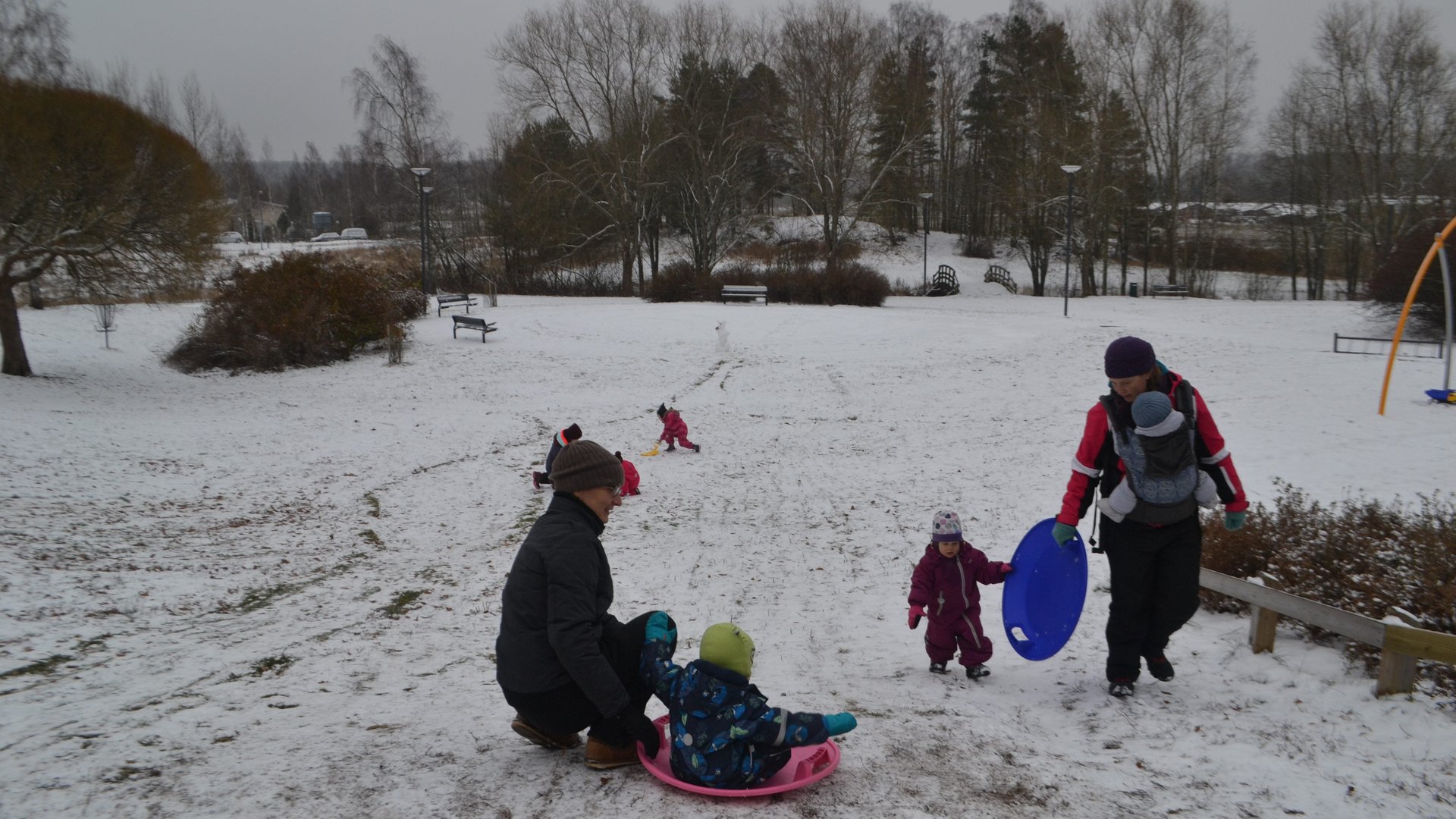
Today, parents in wealthy countries are more likely than their parents or grandparents to raise their children alone, without the support of neighbors, grandparents, aunts and uncles—the proverbial village. But humans are actually wired to raise children within a broader community. “There’s lots of evidence that maybe the biggest problem for parents, more even than poverty, though poverty is a terrible problem, is isolation,” says Alison Gopnik, a professor of psychology at the University of California at Berkeley (UC Berkeley) and an expert in child development. “We have this terrible situation in which people are raising…babies and little children on their own.” Not only is this bad for parents’ mental health, but it can ultimately harm children too, because parents learn about what it takes to raise a child from speaking to family or friends about their experience. And yet many parents don’t have anyone they can turn to to figure out why their baby is crying. Family cafés hope they can provide parents with that person. “Finland is a very individualistic society and we often have difficulties to ask for help,” says Liisa Ylikojola, MLL regional coordinator. “We tend to think that we have to manage on our own. But parenting is teamwork.”
MLL volunteers, many of whom are parents or grandparents themselves, undergo training to host sessions with parents on relevant topics, including children’s development stages, sleep, childcare, and how to balance work and family responsibilities. The training consists of an introduction to MLL’s values and principles, lessons on interacting with children and collecting feedback from parents, and workshops on cooperating with the municipality and other nonprofits and recruiting new volunteers. Some cafés are run by MLL staffers, all of whom have bachelor’s or master’s degrees in education, social work, or health care.
In a 2010 survey of 553 parents (pdf, p.40, link in Finnish) who attended MLL’s family cafés, doctoral researcher Johanna Sourander and her colleagues Elisa Halonen and Anne Viinikka found that half of mothers and 40% of of fathers were looking for support and guidance in their parenting. And most of the parents said that their relationship with their baby had become quite, or very much stronger as a result of the network they developed and the knowledge they gained while attending the cafés. This makes sense, says Gopnik: “Having a sense that everybody has some of the same issues and problems, and you’re not alone, it’s not your child behaving oddly, but also that there’s lots and lots of different ways that children can be, that’s something that comes out when you’re in a room with lots and lots of other parents that just doesn’t if you’re reading a parenting book.”
She adds that programs bringing young parents together and enabling them to support one another, “are absolutely the kinds of programs that we need.”
An imperfect project
Mirjam Kalland, a professor in Early Childhood Education and Care at the University of Helsinki and board member of MLL, interviewed mothers who regularly attend family cafés. She is currently analyzing the data but preliminary results show that these groups may actually improve mothers’ mental health, especially women with high self-reported depressive symptoms during pregnancy. This “was a bit of a surprise for us,” Kalland says, because “it’s usually difficult without a targeted intervention to have effect on depression.” And while she doesn’t yet know what kinds of family café sessions best support mothers’ mental health or how often mothers have to attend them to feel an effect, Kalland says that “there seems to be a pattern where the [family café] is not demanding for you to come by every time or a specific amount of times. You just go there, drink coffee together with other mothers and their babies, and nobody is demanding anything from you.”
Rukka Vainio-Abdullahi met one of her best friends at the international family café in Espoo, which caters to many immigrant parents. Vainio-Abdullahi, who is Finnish, says her friend helped her resolve difficulties she was having with breastfeeding her daughter. But her friend went back to work recently, and Vainio-Abdullahi now sees her less often. Vainio-Abdullahi still comes to the family café with her four-year-old daughter and six-month-old son “because it’s really boring at home and…this is a nice place to come, to talk to people, and then [the kids] can play with other people.” But she hasn’t been able to form the same deep bond with any other parent at the café, for reasons that illustrate some of the main weaknesses of the program as a whole.
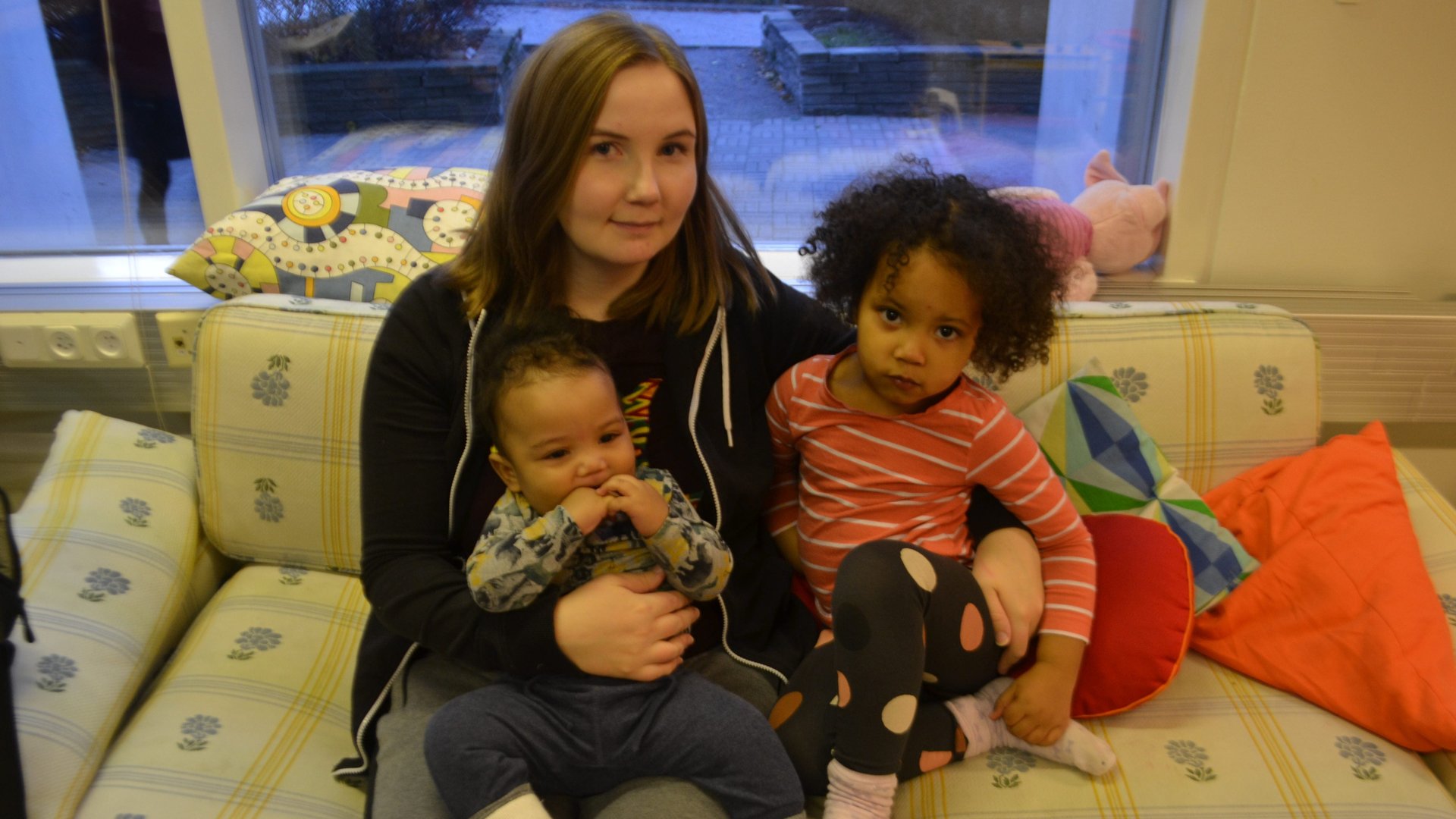
MLL designed the family cafés to be as pressure-free as possible. Parents can come as often as they want. The cafés don’t collect any personal information on those who show up, other than asking them to write their names and their children’s names in a ledger, which is then used to tally up country-wide attendance numbers every year. Kalland says that this openness may contribute to improving parents’ mental health, but it can also weaken the experience for other parents, who may show up only to find the cafés empty. They might meet another parent they click with, but never see them again. When both MLL volunteers who run the international family café were sick earlier this year, they asked Vainio-Abdullahi to open the café in their stead. She did, and waited two hours, but nobody came. Part of the problem is that information on times and dates of family café sessions “is quite scattered,” says Elina Laihomaki, another mom who attends a different family café in Helsinki. Another problem is that the programming is in Finnish, which might turn foreigners away—though most Finns speak English fluently. Vainio-Abdullahi argues that the problem with family cafés goes even deeper, though she can’t quite put her finger on it. “Sometimes, somebody comes here as a new person, and they don’t feel like coming again. That makes me think, is there something wrong with this place?”
When parents stop coming, there’s nothing the MLL volunteers can do, says Eila Liikanen-Aarnio, the volunteer in charge of Espoo’s international family café. “We don’t know where they came from [and] we don’t have any addresses or phone numbers where we could call them and say please come again.”
Finally, even though Finnish fathers take roughly 11% of the total available leave time after the birth of their child, the family cafés are almost exclusively filled with mothers. Timo Arona, who is sledding with his 2-year-old son Elias outside the Kotikolo family café, says he will only go inside if the weather turns sour. He is on a five-month parental leave from his job as a project manager for an IT company and has attended a couple of family café sessions because his wife said she enjoyed them when she was on leave. But Arona hasn’t felt the need to take part in the sessions regularly. In general, fathers take less leave than mothers, which might explain why fewer of them seek out the companionship on offer at family cafés. Whatever the reason, Liikanen-Aarnio says she hasn’t seen a single father attend sessions at the international family café in Espoo in more than two years.
The fertility problem
Outsiders often think of Finland and its Nordic neighbors as paragons of social welfare. They out-perform nearly every country on a broad range of indicators, from paid family leave to healthcare, happiness, and gender equality. And yet, as Toni Malminen, a law professor at the University of Eastern Finland, and Binga Tupamäki, a councillor in the town of Kauniainen, recently wrote in an open letter to the Financial Times (paywall), “In one of ‘the best countries to raise kids’ (according to US News), fewer and fewer are choosing to have them.” In 2018, 47,577 babies were born in Finland, which was 2,744 fewer than the year before. Finland’s population is aging faster than any other European country. Its fertility rate, meaning the total number of children that each woman would have if she were to live to the end of her child-bearing years, reached a historic low of 1.41 in 2018—far below replacement level. Malminen and Tupamäki concluded that “Something is rotten in the state of Finland.”
“I find it interesting that you talk about Finland as being an example, but here we are asking ourselves why people are having so few children,” says MLL’s Maria. In Finland, like elsewhere, the answer to that question is complicated, and ranges from anxiety about climate change, to more women in the workplace and the rising cost of living.
“Of course, if there are less children, there are less family cafés,” MLL’s Ylikojola wrote in an email. “We are not so worried of (sic) what happens to our family cafés, but we are worried of (sic) the fertility rates.”
The massive demographic shift underway in rich countries like Finland has serious implications for the future of social welfare programs like the family cafés, whose role it is to support new parents and their babies, and the impoverishment of initiatives like these is ultimately a loss for everyone. As UC Berkeley’s Gopnik explains, “if you were going to do one thing that makes a difference to both general welfare and inequality, investing in raising young children is the thing that makes the biggest difference.”
Read more from our series on Rewiring Childhood. This reporting is part of a series supported by a grant from the Bernard van Leer Foundation. The author’s views are not necessarily those of the Bernard van Leer Foundation.